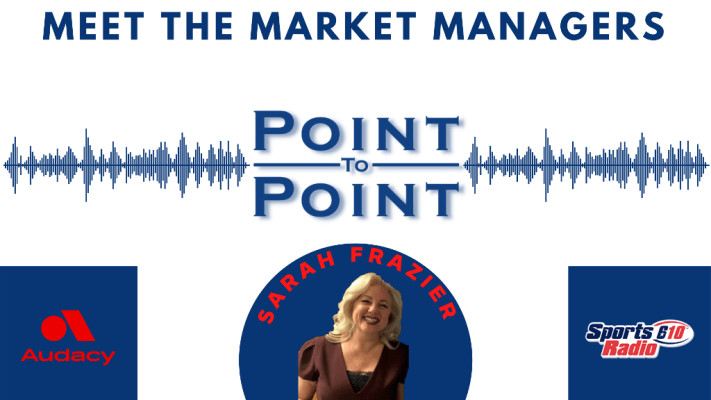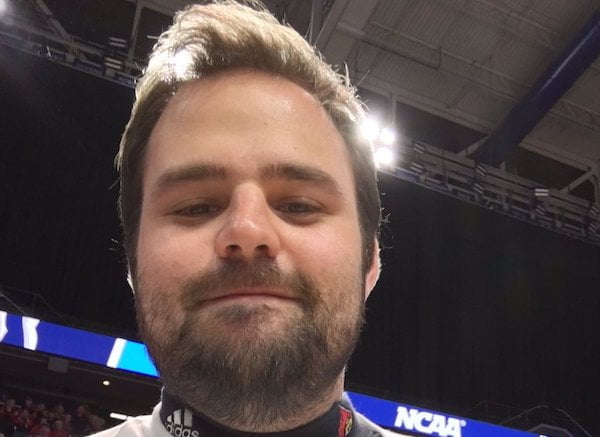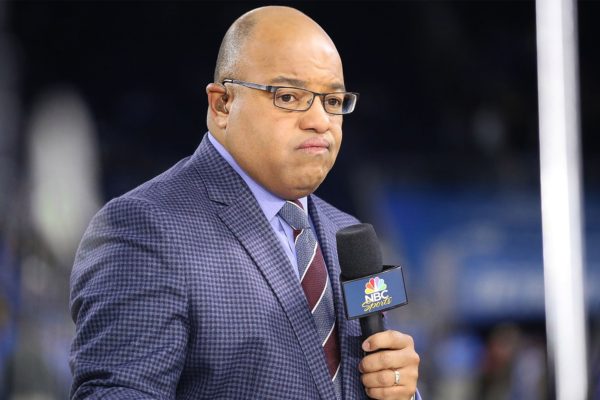Audacy’s Sarah Frazier didn’t originally want to be here. Yes, she always wanted to work in the media in some aspect, but in college at the University of Kansas, Frazier thought she would be a broadcaster. Then, a very blunt professor named Tom Hedrick came into her life.
She was in a sports broadcasting class and Hedrick told her in no uncertain terms that she did not belong on a microphone. He thought Frazier should try sales if she wanted to work in the media business.
“It’s the best thing anybody ever did for me because I wasn’t good,” she told me. “And while I do love the reporting side and I do still love to fancy myself as a journalist, the truth is I’m much better on the business side. So he did me a favor.“
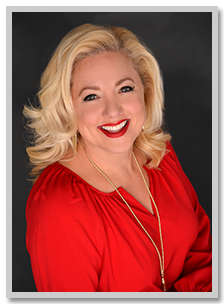
Fast forward to today and Sarah Frazier is entering her tenth year as market manager of Audacy’s Houston cluster. The city has a crowded sports radio landscape and she credits not only her sales team, but the energy that PD Armen Williams brings to the job for helping Sports Radio 610 stand out above the competition in town.
In this week’s Meet The Market Managers conversation, Sarah and I discuss a leader’s role in a crisis, what she would have done differently during the deepfreeze of two months ago, her relationship with the Houston Texans, and why seeing her PD dressed as Richard Simmons reaffirmed her faith in him.
Demetri Ravanos: Entercom recently rebranded to Audacy, and on our side of the business, it was done very well. Everybody knew what was coming and there were no hiccups. Just one day the brand new logo was revealed. But on the ground, what was that process like? Were there any challenges on the local level in terms of getting clients to understand these are the same people you’ve been dealing with all along?
Sarah Frazier: Well, first of all, our team did an amazing job. I think everybody who had worked behind the scenes for so long, I think that it was just so well put together on the back end. Then from the consumer customer facing side, I think everybody expected this. I mean, this is the natural evolution of it. We were so much more than radio.com.
When you look into the future and at all of the podcasts and everything that we’re doing, there’s just so much content. Radio.com just didn’t make sense. I think everybody immediately got it. The coolest thing for me was my 15 year old daughter, when the logo changed, she was like, “oh, hey mom, that’s really cool”. And all of a sudden what I did wasn’t outdated to her. It was now. And that, I think, is the epitome of everything that we’re trying to do.
DR: It’s interesting to hear you talk about the digital side and the idea of radio.com not fitting the future make up of the company. It can be perceived, certainly by people in the industry that I’ve talked to, that Entercom/Audacy is very much planting its flag in the sand that the emphasis moving forward is now on digital, and it’s moving away from broadcast radio. Does it feel that way to you or is there more to it?
SF: Well see, here’s the thing. I don’t think those two things are necessarily intertwined, I think we can play with the distribution for what we deem important. What I mean by that, it doesn’t matter how people are getting their content. It doesn’t matter to us. We’re going to be on those platforms.
What we do realize is that to make sure we’re everywhere, we have to be in the digital space, but that doesn’t make our over-the-air signals any less important. At least that’s what I believe. When you think about everybody that listens to us in Houston every day, most people are listening over the air. I really don’t think that’s ever going to go away. I’m passionate about free local press and I believe that is something that may even become more important as all of this diversification happens. You know you can trust us, and that’s what we’re finding. We’re seeing it in the research that people really trust local media and that’s becoming more and more important as we go.
DR: So as you look back on your whole time leading not just an entire building, but a sales staff as well, you’ve obviously seen digital products grow and grow in terms of their importance within the sales mix. I wonder, have you seen or are we past the point of those challenges impacting sellers? By that I mean, they understand better that they need to be skilled now at selling multimedia platforms not just radio?
SF: To your point, when we started, I was selling spots and maybe sometimes the live broadcast, right? And now, I couldn’t even tell you, Demetri, how many actual things we have to sell. I don’t think the question is, “do they understand they need to sell digital?”. I think the question is “how can we keep them up to speed on all of the different products, the specific uses of each one, and how to package that for their clients?”. When I sit down and try to think about a marketing campaign, which I still do, because I do love to make sure I’m doing the same thing as our sales people are doing so that I understand the challenges of it. But when I put together a campaign and I’m creating and thinking about what different tools I want to use in that media mix for the client, there’s so many that we have that it gets confusing for even me to remember all the things we have and what products do what. There’s just so many. I think that’s the biggest challenge.

I mean, there’s nothing that we can’t do. The level of data that we can get on on a target consumer is creepy. I mean, I could tell you right now who went for a run in my neighborhood and put a mobile message in front of them. Now, that is really trippy when you think about it.
DR: Right. That is a level of data mining that almost seems like it wasn’t meant for radio and television. Who could have foreseen that coming as part of our business?
SF: Yeah. It’s almost to the point where everybody can sell everything. I like that because what that means is the best sellers will win. The best marketers will win. The people that work hardest will win, and put me in that game any day.
DR: So it’s interesting you say that everyone can sell everything because that goes right to a note that I wrote down for one of these interviews a while back, but I’ve just never used. So I’ll ask you, because there is more and more every day that we can sell, do you see a place where your cluster or the industry as a whole can create new revenue? Are there potential products that we just haven’t tapped into yet?
SF: Well sure, I mean, we get something new all the time. The new stuff that we’re doing in the Amazon marketplace and how we can put clients products in that space, I don’t even quite understand that yet. One thing that I’m starting to do because we have so many products is ask myself some questions. What are the right ones that work for clients the best? What are the ones where we can really be competitive? Because I’m not going to use my credibility and sell a client something if that’s not the best thing that we do or that’s not the best fit for them. There’s enough for us to sell and find our way with among the things that we do best. That’s almost always rooted in the core of radio advertising. I mean, that’s our giant megaphone.
But yeah, is something coming down the pike? I’m sure. It’ll probably be here tomorrow.
DR: I often wonder if it’s going to be something that feels like, “Well, Jesus, we thought of that like forever ago.” Like if it becomes something such as putting stickers on local garbage cans. At this point it feels like we’re so far advanced in terms of what we can sell that the next big thing is something we are going to feel so dumb for not having thought of was still an option.
SF: Well, we do forget stuff like that. One thing that’s that’s funny and I’ve been thinking a lot about is that we for so long would just give away tickets over the air, and how we got to thinking that was kind of trite and old. We wondered, ‘how could we reinvent that’? And then here we are getting ready to launch into a bacchanalia of events and people going out, and the one thing they’re going to want more than anything are tickets to events. So yeah, what goes around comes around.
DR: Let’s talk about that for a minute. Texas and Florida have been operating differently, maybe a little more loosely during the pandemic than other states. Now we’re at this point though where nationwide everyone is opening up more and more a little each week. Is there a threshold you are waiting for before you guys are back at the point where live events come back into the sales mix?
SF: I am working through this as we speak. We have been working with Karbach, it’s a brewery here in town. They have this great outdoor space and one of their cornerstones is live music. That’s true for one of our country stations too, 100.3 The Bull. So we’ve been working together on how we can safely get people back out. And we’re going to start in May. We’re going to go on the air a week from yesterday with giveaways for a pod of either four or six tickets. We’re still looking at how they can safely do it the best, but under a pod for you and your friends. And then it’s going to start. We’re going to have a spring concert series. And I think the passion surrounding that is going to be off the charts.
DR: So from the sales standpoint, let’s move giving tickets away to listeners to its own category. You’ve got this opportunity, that is coming really soon, to hand out tickets to a game or to a concert to your most loyal clients again. What do you think that’s going to bring back that you’ve been missing for the past year?
SF: Our cornerstone is definitely the Texans, and I think for our clients, I foresee this Texans season as being a reunion of sorts. There are clients that we have gone through this together with. It’s almost like going to war with somebody. How is your business doing? What can we do to help? How is ours doing?

It just went crazy this time last year, and so our relationships are a lot deeper with those people. I can’t wait to see so many of those people. Our Texans games have always been the time where I get to see our key clients on a bi-weekly basis in the fall. I think that’s going to take on a whole new meaning this year, as I haven’t seen many of them in a long time instead of over Zoom. I just think the relationships that we’ve forged through this period, it’s different than anything I’ve ever experience before. I know these people. I know their families. I know if they had Covid. I know if their kid had to move their wedding three times. I mean, I know so much more about our clients, and I thought I knew him well before.
DR: Speaking of bringing everyone together to rally for the best interest of everyone. Texas just went through a major winter storm. We aren’t used to seeing a deep freeze like that in your state. What were the directives like from you to your programmers at that time in finding the balance of keeping your own people safe, but at the same time, fulfilling your obligation as local broadcasters to keep the community informed during important moments?
SF: Yeah, this one was really tough for me. I’m going to Monday morning quarterback myself in a not so pleasant light. I think that this one just, it completely blew our mind. I’m prepared for a hurricane. I’m prepared for tropical storms. I’m prepared for a zombie apocalypse. I was not prepared for a freeze in Houston, Texas. I have my family here. My parents moved down a few years ago to live two streets away from me, so I have elderly parents. Then we have all of these people and I go immediately into taking care of the human mode.
It was hard to communicate. Our phones were down. I was completely out of communication for a full day, which I have never been before. During Harvey, I got to the studios and I lived there. That’s eventually what happened in this situation, but I was a day late because I couldn’t go anywhere and I was trying to take care of family and and my parents.
The radio became really important because it was like what you talked about before, we pulled out our hurricane radios and cranked them up. People all over the city were in their cars charging phones. We have all of this crazy Texans news going on. So, on the FMs we are talking about the deep freeze, but what we also were hearing from the listeners during this point was. ” just keep the music coming, because it’s all we’ve got.” It was a real struggle. What content do you put on? Do you go into all news and weather or do you keep trying to entertain? What I decided in that minute was that the best thing for us was to keep doing what we’re doing. We kept trying to entertain on the FMs and talk sports on the AM, and still mention it occasionally so listeners know we’re aware of what’s going on. But it wasn’t something that was our focus.
I think in retrospect, I would have taken one of our sticks and went to news and traffic and weather consistently, maybe even just simulcasting our TV partner, just so people had somewhere on the dial to turn for it. A lot of people felt out of the loop and were desperately wanting that information. I wish I would have put one channel dedicated to it. I think I made a mistake there and I won’t make that mistake again.
It’s really hard to know sometimes. I can tell you that I hope we don’t have another ice storm. Then I won’t have to worry about that. But I’m sure there’s going to be a hurricane this year because, I mean, why wouldn’t there be? So we’ll be ready for that.
DR: Let’s go back to the Texans. You mentioned they’re your major play-by-play partner. Obviously, you want to do all you can to keep a good relationship with the team. If they win, more people listen, more clients buy ad time, everyone wins. But things change frequently in sports, and your audience is smart. With all of the news going on around the GM search and Deshaun Watson situation, I would guess there are some negative feelings among even the most diehard fans right now. How do you and Armen Williams discuss where the line is in terms of allowing talent and the audience to be realistic, frustrated, and critical versus worrying about might create friction with your partner?
SF: I think this is probably one of the most underestimated or underrated parts of the job for me, managing that play-by-play relationship and how delicate it is. When I got here in 2009, the team absolutely hated us. They wanted out. They weren’t going to sign the contract. They told us that. And it has been a work in progress ever since.
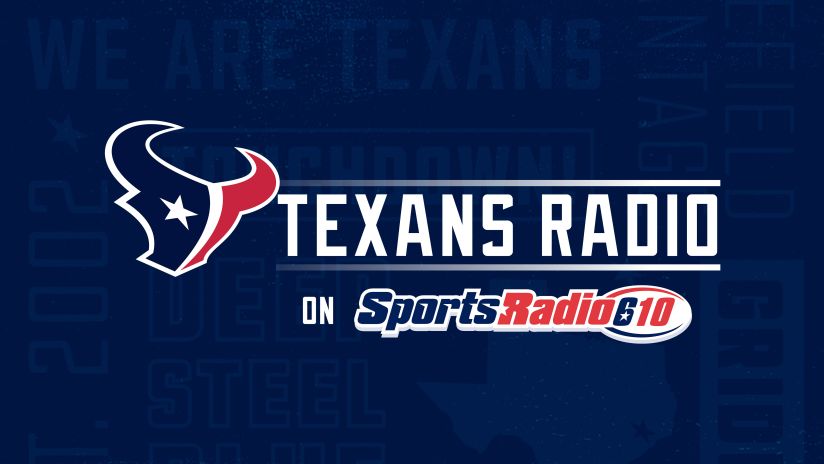
It’s really hard in my chair because I sit between the listeners who think that we’re being homers and our on air team who wants to go full bore toward whatever and be authentic. And they should be. I want them to be! But they get mad because, the perception is that they’re sometimes being homers when the perception from the team side is that we’re way too hard on them. It is a real balance between those two things.
I think it just comes down to the relationship with the team. I was really thankful that I built a strong relationship with the president of the team, Jamey Rootes, and I was very thankful that they named Greg Grissom his successor. Those were relationships that I had worked on for a long time and there’s a lot of trust there. We can call each other and immediately say, “hey, today is going to be a tough day”. We’ve found a really good balance, which is an understanding that it’s not always going to be great, but it can’t be personal. There’s a big line between “this is terrible” or “he’s an idiot”. That’s a pretty clear line and that’s what we try to walk. Let’s talk about things and be objective and fair, but let’s not get personal.
DR: That relationship being one where you feel comfortable enough to pick up a phone and call the office and say, “hey, it’s going to be a tough day”, I would guess eliminates the opposite direction of them calling you at the end of the day and saying, “what the hell was that?”.
SF: Oh, don’t get it twisted, it happens. It is inevitably on a day that I’m not listening. So we have five seasons. There’s five days in a week. I try to listen to a different station every day, which means that four days out of the week, I’m not listening to sports. If I see that call come up, it’s “Oh, God. What is it?” because I don’t know. I’m not prepared.
Armen has been really great. He will text me and say, “The twenty second person just accused DeShaun. Heads up. This just happened”. And so that’s been helpful in making sure I know what’s going on and there’s no blindsides coming.
DR: Houston as a sports radio market I’ve always found interesting because if you count your CBS sports affiliated station, and David Gow’s SportsMap brand, we’re talking about five stations in the format in your market. That means all of those stations are offering sports content and battling for a share of the ratings which isn’t as large as some other places. So for you, what does major success look like for 610? Whether you’re talking about it right now under Armen or previously under Ryan McCredden, what is something that you believe someone coming in to lead the station has to understand in order to compete in Houston?
SF: That’s a really tough question. I don’t spend a whole lot of time thinking about the sports landscape. I spend a lot of time thinking about the Houston landscape, because to me, our competitors are The Buzz (iHeart’s Alternative station in the market), and The Eagle (Cox’s Classic rock station in the market). I don’t spend a whole lot of time thinking about KBME, because their position is so different from us. They’re very focused on the Astros and Rockets, and quite frankly, I think our guys just put on better programing. Of course I do, right? I’m a tad biased.
When I think about the program director, I think it’s about telling a great story. I mean understanding how to keep the listener interested, telling them what they need to know, having a little bit of fun with it. Any station, whether it’s FM or AM, tends to take on a little of the personality of the program director. Armen’s got a terrific personality. He’s fun to be around. He’s energizing. He’s innovative. He comes up with great ideas. He’s passionate. He pushes me and that’s what I like. I like a partner who’s going to be like “this has to happen if we’re going to win” and he is constantly fighting and thinking.
That’s what I think I look for. I want somebody who’s going to want to compete and want to win, and that’s going to push me to do that and not do things the same way. I think that’s what comes across on the air. I think that’s why we’ve grown so much under Armen’s leadership because he’s relentless. He’s got a ton of energy. Holy God!
DR: Have you ever seen the photo of him from college painted head to toe in red and black?
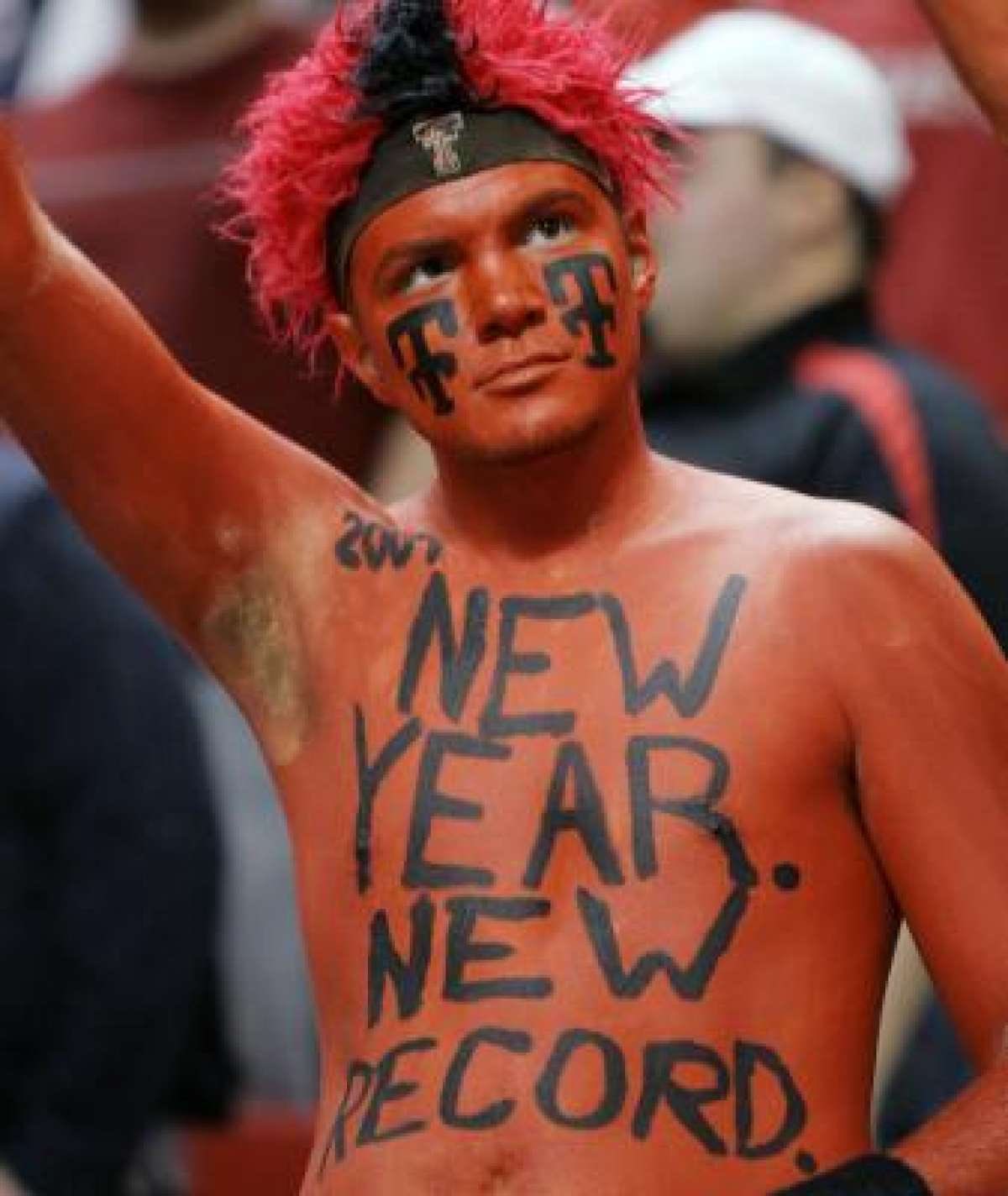
SF: Oh, you bet I have. Well, you know, it’s that passion. Yeah, that’s exactly what I’m talking about. That! !t’s a lot of fun. I think he’s won our Halloween costume contest twice. He is super competitive. I need to get you a picture of him as Richard Simmons.
DR: Please do send me the picture just so I can text it to him in the middle of the night to let him know that I do have it and it could go up on the site at any moment.
SF: You got it!
DR: So in recent years, Audacy and Entercom have made a real commitment to put women in market leadership positions, even in some of the biggest markets that they own. And it’s really interesting when this happens in a cluster that oversees a sports station, because Jason and I talk all the time about the lack of females in programming roles. If you look across the country, there are a few women in programming positions at national networks, but on the local level I can only think of Amanda Brown in Los Angeles who has that position. In your opinion, is there anything a company whether it’s Audacy or someone else, can do to change that, or is it a matter of starting even lower than that and developing the interest in being in this field and building those women up?
SF: We have a problem with female program directors, period. That’s on the music side and sports side. It’s going to take people developing that talent. I’m going through it right now. I would love to hire a woman, but there’s not one that is available for another position that I have that is ready and I don’t have a bench spot. And that is the problem. We’re so thin on the programing side, that there’s not much room for a bench. I think we’re trying to find those spots.
We’ve got a great APD on Mega in Liz, who is learning the ropes right now, and we’ve just promoted Mo to APD for 100.3 The Bull so that she can learn those ropes. I don’t know what’s being done everywhere else. Personally, I’m really trying to find those spaces. In sports, I think it’s really hard. We haven’t even had anyone on the air that would go into that role. So I think we’re going to have to really work toward it. But it’s tough.
To your question, there’s women overseeing clusters in a lot of our markets, and hats off to David Field, Susan Larkin, and Weezie Kramer, because they made a focused effort on making sure that the market manager position was much more equitable. I spent my first year at CBS being one of three female market managers. It was too few. It wasn’t right. Putting women in leadership positions like this, we will figure out how to fix that problem. But you’re right, it’s a problem and it does need to be fixed.
DR: I know there is no right answer to this question. I’m just genuinely curious how you approach it. I want to talk about the part of your job that involves managing up. What is your process or approach when you have to discuss bad news or maybe ask for a budget increase? In those conversations, is there a consistent thing you find yourself feeling you need to do or know before you’re ready to have that talk?
SF: I would say I’m like a lot of women in the fact that I really lean on evidence based data. I look at the numbers consistently and I know my numbers and I understand what’s causing things and I get data to support me because numbers don’t lie.
I guess the question really is, “when am I not managing up?”, because my job is to manage up and to manage down. It’s that critical link between corporate and the market. Without somebody constantly following information both ways, I think it’s really easy for a market to feel isolated, and for corporate to not know what’s going on in that market.
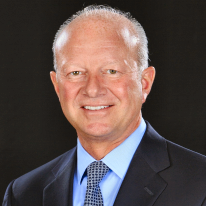
My relationship with Brian Purdy, it’s very unusual. I’ve been working with him for 19 years. There isn’t anything I can say that I think would change his opinion on who I am as a human being. He knows who I am. So I can be angry. I can be frustrated. I can be supremely candid. And it’s OK. I’m real lucky to have that relationship with him, and I understand that. It does give me the opportunity to say some things that some of my colleagues can’t. So often things will come through me up through Brian, that maybe it’s not safe for that message to be sent somewhere else.
Brian probably hates that. I love it because people can reach out to me and say, hey, will you send this message. You bet I will.
Then I have to sell my people up too, because everybody here does a terrific job and it’s really important for corporate to know who is doing what. I’ve been here long enough that I don’t need that credit. The credit can all go to them and I think it’s great to be able to shine a light on a great director of sales in Elena or a great programmer in Armen. I could talk about them all day. It’s the best. It’s the best group of people, and I’m just so lucky to work with them.

Demetri Ravanos is a columnist and features writer for Barrett Media. He is also the creator of The Sports Podcast Festival, and a previous host on the Chewing Clock and Media Noise podcasts. He occasionally fills in on stations across the Carolinas in addition to hosting Panthers and College Football podcasts. His radio resume includes stops at WAVH and WZEW in Mobile, AL, WBPT in Birmingham, AL and WBBB, WPTK and WDNC in Raleigh, NC.
You can find him on Twitter @DemetriRavanos or reach him by email at DemetriTheGreek@gmail.com.




